|
|
|
Sort Order |
|
|
|
Items / Page
|
|
|
|
|
|
|
| Srl | Item |
| 1 |
ID:
104054
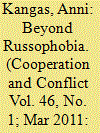

|
|
|
|
|
| Publication |
2011.
|
| Summary/Abstract |
The article offers a practice-based analysis of Finland's relationships with Russia. It works on the basis of ideas that have been presented in conjunction with the so-called practice and pragmatist turns in international relations. After identifying three key schools of thought in previous research on Finnish-Russian relations - primordialist, instrumentalist and identity-based - the article moves on to give a practice turn inspired account of the ways in which the proximity of Russia was dealt with in Finland during the inter-war period. Combining insights from the work of Pierre Bourdieu and Charles S. Peirce, it introduces a research design built with the help of such analytical tools as the doubt-belief model of social action, relational properties and fields. These tools are then applied on research materials that comprise Finnish parliamentary documents and political cartoons. The materials are argued to be particularly well suited for attempts to apply practice insights in actual research, as they simultaneously function as embodiments of meaningful patterns of social and political activity and actively correlate with the urgencies of the contexts in which they appear.
|
|
|
|
|
|
|
|
|
|
|
|
|
|
|
|
| 2 |
ID:
183700
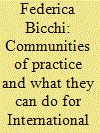

|
|
|
|
|
| Summary/Abstract |
This article argues that communities of practice (CoPs) provide IR with a unique way to understand how a small group of committed people can make a difference to international politics. The point is addressed in three steps. First, the article advances our understanding of how CoPs work. While at its core a CoP is a group of people brought together by a practice they enjoy, a CoP also shares a sense of timing, placing, and humour. These aspects help the group anchor, refine, and innovate their practice in the face of challenges and uncertainty. Second, the article contrasts the analysis of CoPs with other IR approaches, especially institutional analysis, network analysis, and epistemic communities, to show how CoPs supplement them. Third, the article illustrates the argument with the example of the EU foreign policy towards the Israeli-Palestinian conflict. It concludes by suggesting that a CoP's perspective not only helps IR better understand informal politics, but also opens up conversations across disciplines.
|
|
|
|
|
|
|
|
|
|
|
|
|
|
|
|
| 3 |
ID:
141722
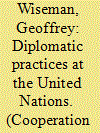

|
|
|
|
|
| Summary/Abstract |
This article considers the importance of informal, practice-based change as opposed to formal change at the UN. I first evaluate UN reform, showing that diplomacy and institutional change within the UN system are better understood as having evolved less from major, formal reform of the UN Charter (‘the Charter’) than from minor changes in routine practices. I then examine what practice theory and diplomatic studies can learn from each other in terms of how each views the role of leading individuals, illustrating specific practice-based change in relation to the Secretary-General’s role. Next, I show how the appointment process for a new Secretary-General has evolved through informal practice, after which I advance an argument that UN diplomatic practices should be considered not only within the narrow context of a formal diplomatic corps of member state diplomats but also as part of an informal, wider diplomatic community of diplomats and non-state actors. Practice theory helps students of diplomacy think more abstractly and systematically about mundane diplomatic practices. Students of diplomacy can help guide practice theory toward empirical diplomatic activities that are often internalized and taken for granted. I conclude that a dialog between the two fields will promote a better understanding of diplomacy as undervalued practices.
|
|
|
|
|
|
|
|
|
|
|
|
|
|
|
|
| 4 |
ID:
148313
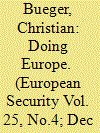

|
|
|
|
|
| Summary/Abstract |
The practice turn provides new avenues for core questions of international relations and European Studies. This article draws on a practice theoretical account to shed new light on the constitution of agency in global politics. An understanding of agency as achievement that requires significant practical work and the participation in international fields of practice is developed. Drawing on the case of the field of counter-piracy practice and the European Union’s (EU’s) work to counter piracy off the coast of Somalia, it is shown how the EU achieved the position as a core actor in the field. A detailed discussion of the EU’s work in interrupting and knowing piracy, in building capacity, and in governing piracy is provided.
|
|
|
|
|
|
|
|
|
|
|
|
|
|
|
|
| 5 |
ID:
173839
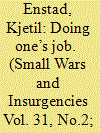

|
|
|
|
|
| Summary/Abstract |
This article investigates how political ambitions are translated into military practice in the small Norwegian contribution to the International Coalition against ISIL in Iraq from 2017 to 2019. The most important Norwegian political aims do not correspond clearly to a military objective, and thus military practice must take on a symbolic function. Understanding the processes of translation that this requires and the social complexity of operating with such aims with partners and Coalition forces is not straight-forward. The analysis of my interviews with commanders and seconds-in-command concludes by suggesting that such missions may require small-state militaries like the Norwegian to reconceive what constitutes core military practices, and that practice theory or the wider disciplines of sociology and anthropology may inform such a reconception.
|
|
|
|
|
|
|
|
|
|
|
|
|
|
|
|
| 6 |
ID:
141724
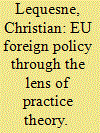

|
|
|
|
|
| Summary/Abstract |
There is a proliferation of works on the new European External Action Service (EEAS). Most of these approach the EEAS through a rationalist framework, assessing how a new institution can solve long-term questions of EU foreign policy-making to ensure consistency and coherence while reducing transaction costs between actors (both supranational and national) in a multilevel governance structure. This paper takes a different direction. Using 30 interviews with officials from the EEAS, the European Commission, and national ministries of foreign affairs, conducted between 2010 and 2013, it shows how the study of practice aids understanding of the nature of the EEAS. As a new institution, the EEAS lends itself particularly well to practice-based study because new institutions must develop new practices.
The first section of the article defines the notion of practice and shows the importance of historicizing the struggles around practices in understanding the creation of the EEAS. The second section demonstrates how agents’ practices shape professional cultures within the EEAS. The third section highlights the relationship between practices and rule-making. Going over the EEAS as a case study, the conclusion focuses on the importance of analysing actors’ practices for understanding the current evolution of diplomacy and international relations in general.
|
|
|
|
|
|
|
|
|
|
|
|
|
|
|
|
| 7 |
ID:
148317
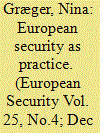

|
|
|
|
|
| Summary/Abstract |
European security is at a critical juncture and many have called for a more coherent and efficient response, involving both the EU and NATO. However, the primary tool for EU–NATO cooperation, “Berlin Plus”, has been stuck in a political quagmire since the mid-2000s, making a lot of scholars to conclude that this cooperation is obsolete and outdated. This article is challenging this view by analysing a range of informal but regular interaction patterns that have emerged. Using practice theory, it sheds new light on and explores how EU and NATO staff at all levels engage in informal practices on various sites in headquarters in Brussels and in field operations. A study of EU–NATO cooperation as practice focuses on the everyday, patterned production of security as well as what makes action possible, such as (tacit) practical knowledge and shared “background” knowledge (education, training, and experience). The article also discusses the extent to which shared repertoires of practice may evolve into loose communities of practice that cut across organisational and professional boundaries.
|
|
|
|
|
|
|
|
|
|
|
|
|
|
|
|
| 8 |
ID:
154463
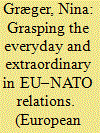

|
|
|
|
|
| Summary/Abstract |
Much scholarly work seeking to explain the EU–NATO relationship emphasises conflicting national or institutional interests, strategic individuals, and operational inefficiencies and overlaps. This article offers an alternative account of how both the everyday and the extraordinary in EU–NATO security cooperation can be identified and analysed by applying practice theory. Despite the “Cyprus issue”, which has left EU–NATO cooperation under Berlin Plus in political stalemate, regular interaction involving civilian and military EU and NATO staff at all levels and various sites has increased over the past decade. The article shows how a practice take is well suited to uncover the practical logic at work in these, predominantly informal EU–NATO encounters; how practices are established, enacted, and also abrupted. Furthermore, it discusses how shared “background conditions” – skills and experience – facilitate practices, learning, and community-building but also competition and rivalry.
|
|
|
|
|
|
|
|
|
|
|
|
|
|
|
|
| 9 |
ID:
145676
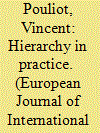

|
|
|
|
|
| Summary/Abstract |
In today’s world, a significant portion of international security politics is conducted through multilateral channels, often from the halls of international organisations such as the United Nations or NATO. This article theorises and empirically documents the production, reproduction, and contestation of local diplomatic hierarchies that practitioners often call ‘international pecking orders’. According to conventional wisdom in IR, the sources of international hierarchies are primarily structural, stemming from the interstate distribution of (material) capabilities. Yet the growing prevalence of multilateral diplomacy in the governance of international security generates distinctive forms of social stratification organised around a struggle for diplomatic competence. As they pursue their instructions and manage security politics, state representatives posted to international organisations make use of the opportunities and constraints of a given situation and compete for rank through the display of practical know-how. The article illustrates this process by looking at how a key set of multilateral practices lend themselves to pecking order dynamics, from esprit de corps to reporting through brokering. By taking the multilateralisation of security politics seriously, the article shows that international hierarchy, far from an unobservable reality, is actually part of parcel of each and every practice that makes the world go round.
|
|
|
|
|
|
|
|
|
|
|
|
|
|
|
|
| 10 |
ID:
175815
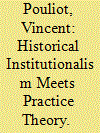

|
|
|
|
|
| Summary/Abstract |
The selection process leading to the appointment of Antonio Guterres as Secretary-General of the United Nations gave way to unprecedented practices in world politics, such as public hearings with candidates. A textbook case of what historical institutionalism calls “layering,” this episode of institutional development features intriguing puzzles, including its timing, form, and limits. Drawing on historical institutionalism and practice theory, I develop a “pulling” theory of agency that complements intentionalist accounts. The webs of practices that agents find themselves in afford certain actions over others, orienting the push of interests. I infer three mechanisms—relational crossover, competence transfers, and pushback—and show how a set of nine practices, available at the UN in 2015–2016 but not in earlier episodes, account for the specifics of the recent renewal of the Secretary-General's selection procedure. A full explanation of this critical case of institutional change is impossible without understanding how agents struggled with one another under the pull of the UN web of practices, affording some innovations but not others.
|
|
|
|
|
|
|
|
|
|
|
|
|
|
|
|
| 11 |
ID:
181535
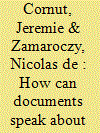

|
|
|
|
|
| Summary/Abstract |
Practice theorists favor interviews and participant observations in their study. Using insights from anthropological works on bureaucratic texts, in this article we develop methodological tools to complement these interpretive methods of data collection. We suggest a way to trace practices by systematically looking through both the content of documents and their form. We probe this approach with an analysis of 408 diplomatic cables sent by the US Embassy in Dar es Salaam, Tanzania in 2005–2009 and subsequently released by Wikileaks. We draw on these documents to tell two related stories about diplomatic practices: the first about epistemic practices and how the cables privilege certain voices and types of knowledge over others, and the second about diplomatic culture, where the cables serve as evidence of the powerful socialization processes that diplomats are subject to. This contributes to International Relations (IR) with a new approach for systematically analyzing written documents to uncover international practices.
|
|
|
|
|
|
|
|
|
|
|
|
|
|
|
|
| 12 |
ID:
094854
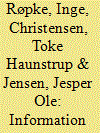

|
|
|
|
|
| Publication |
2010.
|
| Summary/Abstract |
Information and communication technologies (ICTs) increasingly permeate everyday life in industrialized societies. The aim of this paper is to explore ICT-related transformations of everyday practices and discuss the implications, particularly for residential electricity consumption. The present socio-technical changes are seen in a historical perspective, and it is argued that the integration of ICT into everyday practices can be seen as a new round of household electrification, comparable to earlier rounds that also led to higher electricity consumption. A case study carried out in Denmark in 2007-2008 explores the present changes in everyday life. Based on qualitative interviews, the study focuses on people's ways of integrating ICTs into their everyday practices, on any significant changes in these practices, and on the influence of the changed practices on electricity consumption. The paper concludes with a discussion on the implications for energy policy.
|
|
|
|
|
|
|
|
|
|
|
|
|
|
|
|
| 13 |
ID:
099792
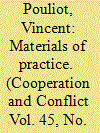

|
|
|
|
|
| Publication |
2010.
|
| Summary/Abstract |
In this article I argue that the Cartesian dualism informing dominant theories of International Relations (IR) has limited analytical purchase at the level of practice. The materials that enable and constrain contemporary diplomatic practices between NATO and Russia seamlessly combine natural, cultural and organizational artefacts: nuclear warheads take on a symbolic life of their own; linguistic formulations transform into 'things'; and committee meetings inscribe intersubjective dynamics with a new materiality. To materialist theories à la neo-realism, practice theory shows that material objects matter not because they have an immanent meaning, but rather because, in becoming part of social relations, they acquire a form of agency of their own, making people do things they would not have done otherwise. To IR constructivism, this article demonstrates that it is not only people who attach meanings to things; things also attach meanings to people. Enmeshed in social relations, material objects often acquire an epistemic life of their own that may affect, in turn, the very people who constructed them.
|
|
|
|
|
|
|
|
|
|
|
|
|
|
|
|
| 14 |
ID:
148034
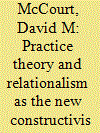

|
|
|
|
|
| Summary/Abstract |
In this theory note, I address two new approaches in international relations theory gaining adherents and producing insightful applications: practice theory and relationalism. Practice theory draws attention to everyday logics in world politics. It stresses how international actors are driven less by abstract notions of the national interest, identities, or preferences than by context-dependent practical imperatives. Relationalism rejects the idea that entities—like states and international organizations—are the basic units of world politics. It replaces them with a focus on ongoing processes. Noting similarities in their arguments to those advanced by early constructivists, I argue that, taken together, practice theory and relationalism represent the New Constructivism in International Relations (IR). A practice–relational turn became necessary because the meaning of constructivism narrowed over time, becoming tied to a specific scientific ontology focusing on the role of identity, norms, and culture in world politics. This ontology unduly narrowed constructivism’s theoretical lenses, which practice theory and relationalism productively reopen.
|
|
|
|
|
|
|
|
|
|
|
|
|
|
|
|
| 15 |
ID:
141721
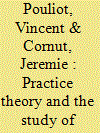

|
|
|
|
|
| Summary/Abstract |
This introductory article explores the multiple synergies between international practice theory and diplomatic studies. The timing for this cross-fertilizing exchange could not be better, as the study of diplomacy enters a phase of theorization while practice scholars look to confront the approach to new empirical and analytical challenges. The article first defines diplomacy as a historically and culturally contingent bundle of practices that are analytically alike in their claim to represent a given polity to the outside world. Then the key analytical wagers that practice theory makes are introduced, and debates currently raging in the discipline are briefly reviewed. Next, it is suggested what a practice theory of diplomacy may look like, discussing a variety of existing works through their common objective to explain the constitution of world politics in and through practice. Finally, a few research avenues to foster the dialogue between diplomatic studies and practice theory are outlined, centered on the nexuses of transformation and reproduction, rationality and know-how, and the technical vs. social dimensions of practices –diplomatic or otherwise.
|
|
|
|
|
|
|
|
|
|
|
|
|
|
|
|
| 16 |
ID:
178009
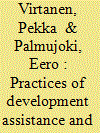

|
|
|
|
|
| Summary/Abstract |
This paper studies how the practices of climate change governance and development assistance have reshaped the Reducing Emissions from Deforestation and Forest Degradation (REDD) process in Mozambique. We look at how the original goals of the Mozambican REDD+ strategy changed in the interplay of different governance-related practices, both those originating locally and nationally, and those coming from international organisations. The paper is based on the frameworks of multilevel governance and practice theory. We identify six combinations of practices that are relevant in the REDD+ programmes and projects. Three of them are incorporated in the general idea of sustainability, including practices of promoting environmental conservation, economic growth and social justice/development, while the remaining three practices are connected to climate-mitigation practices, for which the frame is defined in the United Nations Framework Convention on Climate Change.
|
|
|
|
|
|
|
|
|
|
|
|
|
|
|
|
| 17 |
ID:
181630
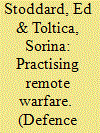

|
|
|
|
|
| Summary/Abstract |
Recent years have seen a significant growth in studies of “remote” and “distanced” forms of military intervention. At present however, few analyses have sought to explore the remote character of interventions beyond Western (especially US&UK) cases despite the fact that regional powers in other parts of the world are increasingly militarily active, particularly in the Middle East. This article seeks to look beyond US and UK cases of remote warfare and explore the remote character of the interventions of Saudi Arabia and United Arab Emirates in Yemen (2015-to date). Using the notion of “practices” that emphasizes both change and continuity in the performance of remote warfare across different contexts, the article shows how Saudi and UAE remote warfare practices show variation both from the US and UK examples and from each other in terms of strategic logics, tactics and the benefits of remoteness. This focus on practices allows us to move beyond debates about what remote warfare is, and who uses it, and permits a broader discussion about change and continuity in the way remote warfare is implemented.
|
|
|
|
|
|
|
|
|
|
|
|
|
|
|
|
| 18 |
ID:
178873
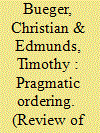

|
|
|
|
|
| Summary/Abstract |
The question of when and how international orders change remains a pertinent issue of International Relations theory. This article develops the model of pragmatic ordering to conceptualise change. The model of pragmatic ordering synthesises recent theoretical arguments for a focus on ordering advanced in-practice theory, pragmatist philosophy, and related approaches. It also integrates evidence from recent global governance research. We propose a five-stage model. According to the model, once a new problem emerges (problematisation), informality allows for experimenting with new practices and developing new knowledge (informalisation and experimentation). Once these experimental practices become codified, and survive contestation, they increasingly settle (codification) and are spread through learning and translation processes (consolidation). We draw on the rise of the maritime security agenda as a paradigmatic case and examine developments in the Western Indian Ocean region to illustrate each of these stages. The article draws attention to the substantial reorganisation of maritime space occurring over the past decade and offers an innovative approach for the study of orders and change.
|
|
|
|
|
|
|
|
|
|
|
|
|
|
|
|
| 19 |
ID:
148678
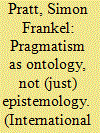

|
|
|
|
|
| Summary/Abstract |
This article is in many ways a pragmatist’s critique of pragmatism in international relations (IR), focusing on what practices scholars have engaged in by drawing upon pragmatism and how to resolve problems that become apparent in considering them. Scholars of IR have used pragmatism largely (though not exclusively) to examine issues of an epistemological or methodological nature, focusing mainly on pragmatism as a philosophy of science. Often overlooked, however, is that pragmatism is not just a philosophy of science, but a distinctive and in some respects quite radical school of metaphysics, and it implies a particularly flexible form of social ontology. I, thus, argue for broader horizons in pragmatist theory in IR. I criticize the overly epistemological or methodological focus of the existing ways many IR scholars have used pragmatism and discuss of how pragmatist social theory fits within existing scholarship in the field. Finally, I suggest how pragmatist social theory can contribute to ongoing IR research programs by dissolving the dualisms of agent and structure, realism and idealism, and normative and strategic action. In other words, as a coherent set of principles, pragmatism offers the foundations for a new movement in the study of international politics—indeed, such a movement has already begun, and I suggest that its horizons are particularly broad.
|
|
|
|
|
|
|
|
|
|
|
|
|
|
|
|
| 20 |
ID:
141727


|
|
|
|
|
| Summary/Abstract |
Innovative mechanisms of global governance are increasingly common, yet they defy easy categorization. The Alliance of Civilizations, a UN initiative that seeks to promote intercultural dialogue, is one such example. It is a hybrid entity that exhibits elements of networks, international organizations, and public–private partnerships, among other things. Only when we shift our gaze to its patterned activities do we discover that it might best be understood as a community of practice specializing in global-level public diplomacy. Practice-based analysis, therefore, allows a deeper understanding of the Alliance and, in turn, prompts a fresh consideration of an increasingly important form of diplomacy. I argue, in particular, that public diplomacy is not solely a national-level, state-oriented activity. In turn, this inquiry invites practice theorists to reflect on the degree of fit required to associate a unique social form with an identifiable set of patterned activities.
|
|
|
|
|
|
|
|
|
|
|
|
|
|
|
|
|
|
|
|
|